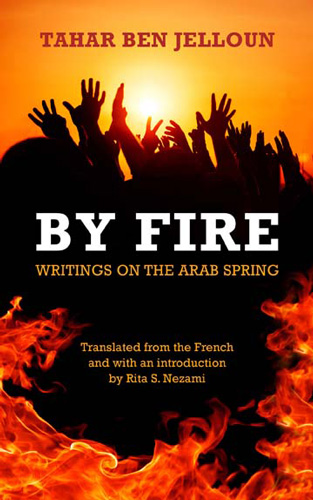By Fire
By Fire: Writings on the Arab Spring, by Tahar Ben Jelloun, due out in June, is a fictionalized account of the suicide by immolation of a young Tunisian man named Mohamed Bouazizi.
By Fire: Writings on the Arab Spring, by Tahar Ben Jelloun, due out in June, is a fictionalized account of the suicide by immolation of a young Tunisian man named Mohamed Bouazizi.
But it’s more than that. By Fire and Ben Jelloun’s nonfiction book on Tunisia, The Spark, were originally published in French in 2011. This English translation by Rita S. Nezami includes extensive historical background, translated portions of The Spark, and a section on the Tunisian constitution. These all precede Ben Jelloun’s novella and take up more than half of the book. Call it a study guide.
Tahar Ben Jelloun is a Moroccan author of 35 works who was shortlisted twice for the Nobel Prize in Literature. When interviewed for The New Yorker in 2013 by Deborah Triesman, Ben Jelloun stated:
I had written articles and an essay attempting to explain the roots of this “Spring.” But those pieces were missing a literary perspective, a fictional perspective that could depart from the raw facts. I needed to express, as a novelist, what I, as an observer and a citizen, was thinking.
The fact is that on December 17, 2010, in Sidi Bouzid, Tunisia, 26-year-old Mohamed Bouazizi set himself on fire to protest confiscation of his fruit cart and the repeated physical and verbal abuses by authorities. He died 15 days later.
Ben Jelloun’s novella is a quick read, though not a comfortable one. We meet the main character, also named Mohamed, just after his father dies. This Mohamed is 30-years-old, has never celebrated his birthday, and has three brothers, two sisters, and a diabetic mother.
Following his father’s funeral, Ben Jelloun writes, “His mind was made up: he would take over his father’s cart. [ . . . ] He would have to repair the wheels, replace a rotten plank, have the weighing scale recalibrated, and get in touch with Bouchaïb, the fruit and vegetable supplier,” who is not only deceitful but proposes a deal to marry Mohamed’s sister.
Competition among vendors is fierce, bribes are rampant, and at one point the police offer Mohamed a profitable spot to sell his produce if he will become an informer.
In spite of the corruption in this unnamed city, Mohamed still has dreams, which he shares with his girlfriend Zineb, who’s eager to get married: “[ . . . ] I’d really like to open a store at the market,” he says, planning to take over a business from a sick neighbor. “This would be an ideal solution for me,” he tells her. But Mohamed’s optimism about his future is short-lived. Things turn violent. “Two uniformed police officers, one of them a woman, threw him to the ground” and seized his cart, telling Mohamed he has no work permit or license and pays no taxes. “Now get lost,” says the female officer.
His repeated attempts to get the mayor or any official to help him are in vain. In his final attempt, he’s again confronted by police. “Mohamed tried to defend himself. This time the female officer took her turn slapping him and spitting on his face,” writes Ben Jelloun.
The translator Nezami states: “His was probably the cry of a man left with no good choices about making a living in the barren and dusty outpost of Sidi Bouzid, a town of only thirty-six thousand people near the center of Tunisia.” She adds, “He could not endure the daily struggle and pressure to feed his family and remain beholden to the local government’s petty tyrannies.”
I read this book from start to finish. By the time I actually reached the novella, after reading so much background information, it was difficult to think of Ben Jelloun’s story as fiction. If I had a do-over, I’d read the novella first, then backtrack to the explanatory materials. The translator backs me up on this, saying, “Despite the historical material’s importance, the story is freestanding: in many ways, it can be read without knowing any more than what is on the page.”
Whether you read By Fire: Writings on the Arab Spring in its natural order or skip to the novella, this book is an eye-opening account of a man who ran into too many barriers to living the life he wanted for himself and his loved ones. It’s a sad and important book, and as Ben Jelloun writes, “Beyond the specific situation in Tunisia, Mohamed Bouazizi became a valuable symbol for all cultures and all countries in pursuit of dignity.” Watch for By Fire in June. It’s a powerful compilation of fact and fiction.





